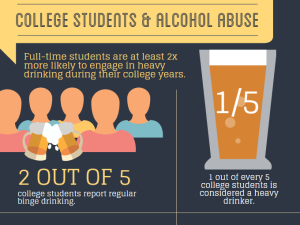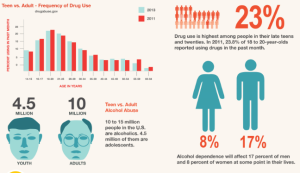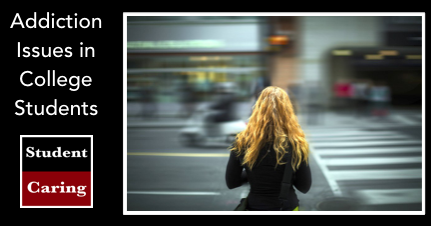Going off to college is a coming of age moment for many teenagers. For some it’s the first time they will be living away from their parents, be expected to handle many of their own responsibilities, and stay on track with their education on their own. Independence is almost thrust upon them as their parents drive away and they are forced to feed themselves, do their own laundry, and mentally juggle the stresses of semi-adult life with college coursework. Some students rise to the challenge and thrive whereas others might struggle a little more. They are given freedom in an environment where their peers are sometimes their only close contact. They are exposed to new surroundings, exciting liberation, and no parents around to enforce homework time or a curfew. In an environment where partying, drinking, and using drugs isn’t unheard of or even all that uncommon, it’s easier for some students to begin to rely on them due to a variety of these factors common to college life.
Stress
College is stressful. College coursework is far beyond that expected of a high school student and many college freshmen aren’t properly prepared for the shift. Even upperclassmen suffer from school related stress that has nothing to do with a lack of preparation, but an exceeding expectation of their educational abilities. The rise in expectation is a natural occurrence and important for the amount of education that a degree requires, but it doesn’t make the process any less stressful. College students are buried in academic stress studying for midterms and finals, catching up on reading, taking notes in class, and scrambling to finish assignments by their deadline. But this is only part of it. Consider also the stresses of learning how to live on your own, manage money, possibly have a job, juggle a social life, and deal with social expectations.
Because of so much stress from so many different places, it’s not uncommon for students to seek out a relief. This age group is also reliant on social interaction and entertainment. One common use for stress release, social interaction, and entertainment is substance use. Not every student experimenting with substances becomes an addict, of course, but some others do. The causes behind who is affected by addiction and who isn’t are unknown although some factors include genetics, biology, family history and environment. Stress is a relatively common substance trigger, so it’s no wonder that it is commonly found in this group of people.

Infographic courtesy of Waters Edge Recovery
Environment
A college environment is a common place for substance use to happen as mentioned before. The culture surrounding many campuses is about having fun, spending time with peers, and finding ways to relieve the common college stress. One of the factors that come into play when discussing addiction is a person’s environment. If you are in an environment where drugs and drinking aren’t an issue and are relatively common, you are more likely to use those substances as well.
Addiction is a brain disease affecting the communication and pleasure centers of the brain. Drugs manipulate these areas and for younger people, their brains aren’t fully developed enough to deter their brain from being altered by the effects that these chemicals have on them, making them more at risk for addiction issues. In an adult setting outside of the college world, frequent substance use isn’t as common and is seen as more of a red flag outside of that environment. This is why substance abuse, and therefore addiction, can be more common in a college environment.
Social Pressure
Social interaction and peer involvement is extremely important for college aged people because they can be their only source of interaction if they are far from home. Also, the importance of friends and social acceptance is just something more important to teens and young adults in general as they mature. Even if students aren’t being pressured outright into substance use, it can be a social expectation and a feeling of pressure to join in on using certain substances in social situations in order to fit in with their peers. In an environment where students are stressed and substance use happens often, it’s not hard to imagine how the social pressure might get to them.

Infographic courtesy of Sober College
Prevention/Treatment
Most college campuses have a lot of programs geared towards the prevention of substance use on campuses with strict rules on consumption and possession on school grounds especially. Many offer counselling options related to addiction, transportation options to prevent drinking and driving, and clubs on campus involved in the prevention and treatment of substance abuse. Since the rate of substance use is so much higher in the college age group, the active programs focused on prevention as well as treatment are vital for students. It’s important to be aware of the problems associated with substance abuse in college but note that not every student will use and not every student that does use will end up becoming dependent on it. Substances react to everyone in a different way, but the idea behind prevention and treatment options is to help those that are affected in a negative way.
The college experience is one to soak in and enjoy while you can. Students are young, independent, furthering their education, and surrounded by peers in the same situation that they are. They are discovering themselves, learning about a life beyond their parent’s house, and having all new experiences. This point in life for a young adult is vital to their growth and a necessary experience in independence. The risk of addiction related to the common substance use in this environment is one to be aware of but not one to scare kids away from experiencing this aspect of education. Students should be aware of the risks and proceed with caution, but still continue to have fun with their college experience.
 Author bio: Chelsy is a writer from Montana who graduated with her journalism degree from the University of Montana in 2012. She is passionate about advocating for those in addiction recovery, loves listening to talk radio, and can commonly be found throwing a Frisbee for her dog, Titan. Follow her on Twitter!
Author bio: Chelsy is a writer from Montana who graduated with her journalism degree from the University of Montana in 2012. She is passionate about advocating for those in addiction recovery, loves listening to talk radio, and can commonly be found throwing a Frisbee for her dog, Titan. Follow her on Twitter!
We welcome your feedback.
Email: General Information | Dr. Daniel de Roulet | Prof. David C. Pecoraro
Thank you!
Daniel & David
###
Addiction Issues in College Students / Guest Post by Chelsy Ranard


0 Comments